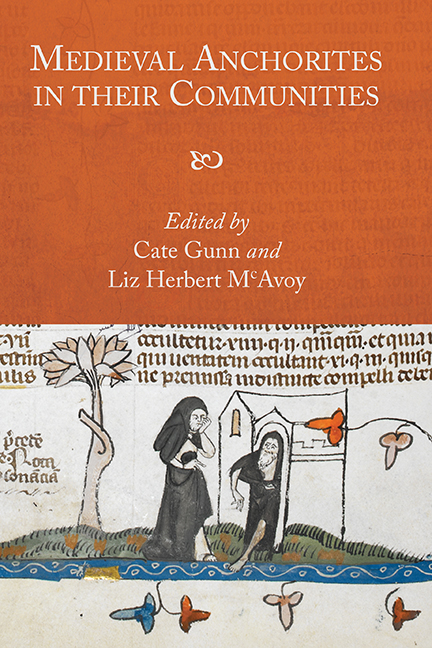Book contents
- Frontmatter
- Dedication
- Contents
- List of Illustrations
- Acknowledgements
- List of Contributors
- Abbreviations
- Introduction: ‘No Such Thing as Society?’ Solitude in Community
- 1 ‘O Sely Ankir!’
- Part I Religious Communities
- Part II Lay Communities
- 5 English Nuns as ‘Anchoritic Intercessors’ for Souls in Purgatory: The Employment of A Revelation of Purgatory by Late Medieval English Nunneries for Their Lay Communities
- 6 ‘In aniversaries of ower leoveste freond seggeth alle nihene’: Anchorites, Chantries and Purgatorial Patronage in Medieval England
- 7 ‘Item receyvyd of ye Anker’: The Relationships between a Parish and its Anchorites as Seen through the Churchwardens’ Accounts
- 8 The Curious Incident of the Hermit in Fisherton
- 9 Was Julian's Nightmare a Māre? Julian of Norwich and the Vernacular Community of Storytellers
- Part III Textual Communities
- Bibliography
- Index
- Miscellaneous Endmatter
8 - The Curious Incident of the Hermit in Fisherton
from Part II - Lay Communities
Published online by Cambridge University Press: 30 August 2017
- Frontmatter
- Dedication
- Contents
- List of Illustrations
- Acknowledgements
- List of Contributors
- Abbreviations
- Introduction: ‘No Such Thing as Society?’ Solitude in Community
- 1 ‘O Sely Ankir!’
- Part I Religious Communities
- Part II Lay Communities
- 5 English Nuns as ‘Anchoritic Intercessors’ for Souls in Purgatory: The Employment of A Revelation of Purgatory by Late Medieval English Nunneries for Their Lay Communities
- 6 ‘In aniversaries of ower leoveste freond seggeth alle nihene’: Anchorites, Chantries and Purgatorial Patronage in Medieval England
- 7 ‘Item receyvyd of ye Anker’: The Relationships between a Parish and its Anchorites as Seen through the Churchwardens’ Accounts
- 8 The Curious Incident of the Hermit in Fisherton
- 9 Was Julian's Nightmare a Māre? Julian of Norwich and the Vernacular Community of Storytellers
- Part III Textual Communities
- Bibliography
- Index
- Miscellaneous Endmatter
Summary
THE hermit was a familiar feature within the medieval religious landscape. Withdrawn from certain aspects of worldly affairs, hermits were actively dedicated to others: the functions ranged from the philanthropic (repairing roads, taking care of bridges, collecting alms for personal and public use), the religious (looking after shrines, celebrating divine office) and the pastoral (consoling and advising those who needed help). Though seemingly separated from society and existing on the margins, hermits played an important social role that the ecclesiastical hierarchy desired to regulate.
From the mundanely practical to the charismatic, hermits were often the accessible entry-point for the laity to the religious life. Subsequently, the role of the hermit is often compared to other types of solitary religious vocation that fulfilled a similar function. Hermits are frequently compared – and at times the terminology is interchangeable – with anchorites. Though sharing origins, the two categories of religious solitary life, eremitism and anchoritism, became gradually more distinct from each other, with the term anchorite specifically referring to an enclosed figure, withdrawn and retired from the world. Hermits, as their roles noted above suggest, had the option of greater liberty, if they so chose. As other contributors to this present volume also demonstrate, both groups of solitaries, though seemingly excluded, were, in fact, central to the community. The solitaries occupied a distinct social niche, albeit one that was open to error and abuse.
One curious case is recorded in a 1352 mandate issued by Robert Wyvil, the bishop of Salisbury (1330–65). Addressed to the members of his cathedral and to the nearby college of St Edmund, Wyvil alerted them to an abuse of eremitic status. The text survives in a heavily abbreviated copy of the mandate recorded in the bishop's register, WSA D1/2/3 v. 1, f.210v, kept at the Wiltshire and Swindon Archive in Chippenham. Specifically, the mandate informed the members of the cathedral and college of the existence of an unnamed man in the adjacent village of Fisherton accused by the bishop of leading honest believers astray by assuming the garb of clerical dress and pretending to be a hermit (‘sub pallio simulate religionis habitum gestans heremitam se confingens’).
- Type
- Chapter
- Information
- Medieval Anchorites in their Communities , pp. 131 - 146Publisher: Boydell & BrewerPrint publication year: 2017



